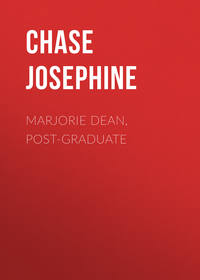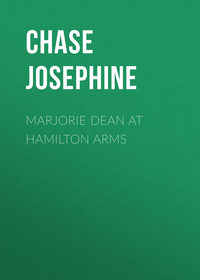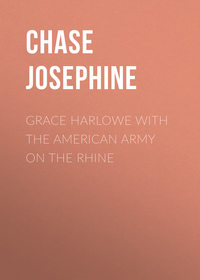 полная версия
полная версияMarjorie Dean, High School Junior
Brought together again after more than two months’ separation, a busy wagging of tongues was in order, mingled with the ready laughter that high-spirited youth alone knows. Everyone had something interesting to tell of her vacation and rejoiced accordingly in the telling. Father Time flew in his fleetest fashion, but no one of the group paid the slightest attention to the fact. From vacation, the conversation gradually drifted into school channels and a lively discussion of junior plans ensued.
“By the way, girls,” remarked Jerry Macy with the careless assumption of casualty which was her favorite method of procedure when about to retail some amazing bit of news. “Did you know that Miss Archer almost decided to resign her position at Sanford High for one in Chicago?”
“Of course we didn’t know it, and you know we didn’t,” laughed Susan Atwell. “Whenever Jerry begins with ‘By the way,’ and tries to look innocent you may know she has something startling to offer.”
“Where on earth do you pick up all your news, Jerry?” asked Constance Stevens. “You always seem to know everything about everybody.”
“Oh, it just happens to come my way,” grinned Jerry. “I heard about Miss Archer from my father. He’s just been elected to the Board of Education.”
“She isn’t really going to leave Sanford High, is she, Jerry?” An anxious frown puckered Marjorie’s smooth forehead. She hated to think of high school without Miss Archer.
“No. At first she thought she would, but afterward she decided that she’d rather stay here. She told father that she had grown so fond of the dear old school she couldn’t bear to leave it. I’m certainly glad she’s not going to resign. If she did we might have kind, delightful Miss Merton for a principal. Then —good night!” Jerry relapsed into slang to emphasize her disgust of such a possibility.
“I shouldn’t like that,” Marjorie remarked bluntly. “Still, I can’t help feeling a little bit sorry for Miss Merton. She shuts out all the bright, pleasant things in life and just sticks to the disagreeable ones. Sometimes I wonder if she was ever young or had ever been happy.”
“She’s been a regular Siberian crab-apple ever since I can remember,” grumbled Jerry. “Why, when I was a kidlet in knee skirts she was the terror of Sanford High. I guess she must have been crossed in love about a hundred years ago.” Jerry giggled a trifle wickedly.
“She was,” affirmed quiet Irma with a smile, “but not a hundred years ago. I never knew it until this summer.”
“Here is something I don’t seem to know about,” satirized Jerry. “How did that happen, I wonder?”
“Don’t keep us in suspense, Irma,” implored Muriel Harding. “If Miss Merton ever had a love affair it’s your duty to tell us about it. I can’t imagine such an impossibility. Did it happen here in Sanford? How did you come to hear of it?”
A circle of eager faces were turned expectantly toward Irma. “My aunt, whom I visited this summer, told me about it,” she began. “She lived in Sanford when she was a girl and knew Miss Merton then. They went to school together. There were no high schools then; just an academy for young men and women. Miss Merton was really a pretty girl. She had pink cheeks and bright eyes and beautiful, heavy, dark hair. She had a sister, too, who wasn’t a bit pretty.
“They were very quiet girls who hardly ever went to parties and never paid much attention to the boys they knew in Sanford. When Miss Merton was about eighteen and her sister twenty-one, a handsome young naval officer came to visit some friends in Sanford on a furlough. He was introduced to both sisters, and called on them two or three times. They lived with their father in that little house on Sycamore Street where Miss Merton still lives. The young ensign’s furlough was nearly over when he met them, so he didn’t have much time to get well acquainted with them. The night before he went away he asked Miss Merton if he might write to her and she said ‘Yes.’”
“Some story,” cut in Jerry. “And did he write?”
“Don’t interrupt me, Jeremiah,” reproved Irma. “Yes, he wrote, but – ”
“Miss Merton never got the letter,” supplemented the irrepressible Jerry. “That’s the way it always happens in books.”
“All right. You may tell the rest of it,” teased Irma, her eyes twinkling.
“Someone please smother Jerry’s head in a sofa cushion, so she can’t interrupt,” pleaded Harriet.
“Try it,” challenged Jerry. “Excuse me, Irma. I solemnly promise to behave like a clam. On with the miraculous, marvelous memoirs of meritorious Miss Merton.”
“Where was I? Oh, yes. The young ensign wrote, as he thought, to Miss Merton, but in some way he had confused the two sisters’ first names. So he wrote to Alice Merton, her sister, instead, thinking it was our Miss Merton.”
“How awful! The very idea! What a dreadful mistake!” came from the highly interested listeners.
“The sister was delighted because she liked the ensign a lot and thought he didn’t care much about her. You can imagine how Miss Merton felt. She never said a word to anyone then about his asking her if he might write. She thought he had just been flirting with her when really he had fallen in love with her. Then his ship went on a trip around the world, but he kept on writing to the sister, and at last he asked her to marry him. So they were engaged and he sent her a beautiful diamond ring. They planned to be married when he received his next furlough. But when he came to Sanford to claim his bride, he found that he had made a terrible mistake.”
“What did he do then?” chorused half a dozen awed voices.
“Oh, he made the best of it and married the sister,” Irma replied with a shrug. “I suppose he felt that he couldn’t very well do anything else. Perhaps he didn’t have the courage to. But one day before his wedding he went to the house and found Miss Merton alone. She had been crying and he felt so sorry that he tried to find out what was the matter. Somehow they came to an understanding, but it was too late. Three or four years after that he was drowned during a storm at sea. Miss Merton never quite got over it all, and it changed her disposition, I guess.”
“What a sad story.” Constance Stevens’ blue eyes were soft with sympathy.
“That makes Miss Merton seem like a different person, doesn’t it?” Marjorie thoughtfully knitted her brows.
“I suppose that is why she acts as though she hated young people,” offered Mary. “We probably remind her of her cheated youth.”
“She should have been particular enough to let that stupid ensign know that she was she,” criticized practical Jerry. “I’m glad I haven’t a sister. There’s no danger of any future aspirant for my hand and heart getting me mixed with Hal.”
The sentimental shadow cast upon the group by Irma’s romantic tale disappeared in a gale of laughter.
“Honestly, Jerry Macy, you haven’t the least idea of romance,” giggled Susan. “Here Irma tells us a real love story and you spoil it all about a minute afterward.”
“Can’t help it,” asserted Jerry stoutly. “I have to say what I think.”
“Oh, here come Captain and Charlie,” cried Marjorie, sighting a gracious figure in white descending the steps with Charlie in tow. “That means dinner is about to be served, children. Our farewell feast to Lieutenant Mary Raymond.”
CHAPTER III – THE SHIELD OF VALOR
A chorus of ohs and ahs ascended as the guests filed into a dining room, the decoration of which spelled Patriotism in large capitals. In honor of the pretty soldier play to which she and Mary had so long clung, Marjorie had decreed that the dinner should be a patriotic affair so far as decorations went. The walls of the large, attractive room were plentifully festooned with red, white and blue bunting. Flags were in evidence everywhere. From the center of the large oak table a large doll dressed as Uncle Sam held gallantly aloft the tri-colored ribbons that extended to each place. On one side of him stood a smaller doll dressed in the khaki uniform of the United States soldier. On the other, a valiant Jackie stood guard. At each cover was a small soldier doll and the place cards were tiny, folded, silk flags, each guest’s name written in one of the stripes of white uppermost.
Mary occupied the seat of honor at the head of the table, with Marjorie at her right and Constance at her left. But at the departing Lieutenant’s place rose an amazing pile of tissue-paper wrapped, beribboned bundles that smacked of Christmas.
“Company, attention,” called Mrs. Dean from the foot of the table, the instant the party had seated themselves. “Lieutenant Raymond, you are ordered to inspect your wealth before mess.”
“I – oh – ” stammered the abashed Lieutenant, regarding said “wealth” in stupefaction. “All those things are not really for me!”
“Open them and see,” directed Marjorie, her face radiant with unselfish happiness. “Every one of them holds an original poetic message. None of us knows what the other wrote. You are to read them in a loud voice and satisfy our curiosity. Now hurry up and begin.”
Under a battery of smiling faces, Mary slowly undid a good-sized square bundle. With slightly shaking fingers she drew forth a white box. When opened it displayed several sizes of note paper and envelopes bearing her monogram in silver. Picking up a card she steadied her voice and read:
“You say, of course, ‘I’ll surely write,’ But when you’ve traveled out of sight, This nice white box may then remind you Of Jerry Macy, far behind you.”“I truly will write you, Jerry. Thank you.” Mary beamed affectionately on the stout girl. “It’s a lovely present, and my own monogram, too.”
“See that you do,” nodded Jerry gruffly. She loved to give, but she did not relish being thanked.
“Next,” smilingly ordered Marjorie. “If you don’t hurry and open them, we shall all starve.”
The next package disclosed a dainty little leather combination purse and vanity case from Muriel Harding with the succinct advice:
“Don’t lose your ticket or your money, To be stone broke is far from funny. When wicked cinders seek your eye, Consult your mirror on the sly.”After Muriel had been thanked and her practical, poetic advice lauded, Mary went on with her delightful investigation. An oblong bundle turned out to be a box of nut chocolates from Susan, who offered:
“In time of homesick tribulation, Turn to this toothsome consolation. To eat it up will be amusin’ — Here’s sweet farewell from giggling Susan.”“Giggling Susan’s” effort brought forth a ripple of giggles from all sides.
“That’s my present,” squealed Charlie, as Mary fingered a tiny package ornamented with a huge red bow. “It’s a – ”
“Shh!” warned Constance, placing prompt fingers on the too-willing lips.
Mary cast the child a tender glance as she glimpsed a tiny leather violin case, partially obscured by a card. In this instance it was Uncle John Roland who had played poet, after receiving Charlie’s somewhat garbled instructions regarding the sentiment.
“Say it s’loud as you can,” commanded the excited youngster.
Mary complied, reading in a purposely loud tone that must have been intensely gratifying to the diminutive giver:
“Once when away from home I ranned To play my fiddle in the band, You comed and finded me, ’n then I never ranned away again. So now I’m always nice and good An’ do as Connie says I should, And ’cause you’re going to run away You’d better write to me some day! Inside the little fiddle box There is a fountain pen that talks On paper – it’s for you from me, The great musishun; your friend, C.”As Mary read the last line she slipped from her place to Charlie and kissed the gleeful, upturned face. “You darling boy,” she quavered. “Mary won’t forget to write.”
“Mine’s the best of all,” observed Charlie with modest frankness, as he enthusiastically returned the kiss.
Back in her place again, Mary finished the affectionate inspection of the tokens her friends had taken so much pleasure in giving. There was a book from Harriet, a folded metal drinking cup in a leather case from Esther Lind, a hand-embroidered pin and needle case from Irma, a pair of soft, dark-blue leather slippers from Constance, and a wonderful Japanese silk kimono from Mrs. Dean. The remembrances had all been selected as first aids to Mary during her long journey across the country. With each one went a humorous verse, composed with more or less effort on the part of the givers.
But one package now remained to be opened. Its diminutive size and shape hinted that it might have come from the jeweler’s. Mary knew it to be Marjorie’s farewell token to her. She would have liked to examine it in private. She was almost sure that she was going to cry. She thrust back the inclination, however, flashing a tender, wavering smile at her chum as she untied the silver cord that bound the box. It bore the name of a Sanford jeweler and when the lid was off revealed a round, gold monogrammed locket, gleaming dully against its pale blue silk bed. In a tiny circular groove of the box was a fine-grained gold chain.
Mary’s changeful face registered many emotions as she took the locket in her hands and stared at it in silence. Acting on a swift, overwhelming impulse she sprang mutely from her chair and rushed out of the room. Marjorie half rose from her place, then sat down again. “Lieutenant will come back soon,” she said fondly. “She hasn’t really deserted from the army, she’s only taken a tiny leave of absence. I remember just how I felt when some of the boys and girls of Franklin High gave me a surprise party. That was the night this came to me.” She patted the butterfly pin that had figured so prominently in her freshman year at Sanford. “I almost cried like a baby. I remember that the whole table blurred while Mary was making a speech to me about my beautiful pin.” Marjorie talked on with the kindly object of centering the guests’ attention on herself until Mary should return.
Meanwhile, in the living room Mary Raymond was engaged in the double task of trying to suppress her tears and open the locket at the same time. Her eyes brimming, she worked at the refractory gold catch with insistent fingers. Opened at last, she beheld Marjorie’s lovely face smiling out at her. On the inside of the upper half of the locket was engraved, “Mary from Marjorie.” Below was the beautiful Spanish phrase, “Para siempre,” literally translated, “for always,” but meaning “forever.”
Within a brief space of time, following her flight, the runaway reappeared, her eyelids slightly pink. “I hope you will all pardon me,” she apologized prettily. “I – I – couldn’t help it. You’ve been so sweet to me. I can’t ever thank you as you deserve to be thanked for giving me so many lovely things; the very ones I shall need most when I’m traveling. I am sure you must know how dear you all are to me; dearer even than my Franklin High friends. I hope each one of you will write to me. I’ll truly try hard not only to be a good correspondent, but always to be worthy of your friendship.”
Mary’s earnest words met ready responses of good fellowship from those whom she had once scorned. Everything was so different now. The new Mary Raymond was an entire opposite to the sullen-faced young person who had once flouted all overtures of friendship on the part of Marjorie’s particular cronies. Beyond an eloquent hand clasp and, “My picture locket is wonderful, Lieutenant. Thank you over and over,” Mary had reserved further expression of her appreciation until the two chums should be entirely by themselves.
The delightful dinner ended with a general distribution of fancy cracker bon-bons, which the guests snapped open with a will, to find cunning caps representing the flags of various nations. They donned these with alacrity and trooped into the living room for an evening of stunts in which music played an important part. Constance lifted up her exquisite voice untiringly, weaving her magic spell about her eager listeners. Jerry sang a comic song, mostly off the key, merely to prove the impossibility of her vocal powers. Charlie Stevens, who had trustfully tugged his faithful fiddle along, insisted on rendering a solo of anguishing shrieks and squawks, assuming the majestic mien of a virtuoso. He took himself so seriously that no one dared laugh, although the desire to do so was throttled with difficulty. Susan was prevailed upon to perform a scarf dance, her one accomplishment, using a strip of red, white and blue bunting with graceful effect. Harriet Delaney also sang a ballad, and Esther Lind offered a beautiful Swedish folk song she had learned from her father, who had sung it as a boy in far-off Scandinavia. When the small repertoire of soloists had been exhausted, everyone turned to with Constance at the piano, and made the living room ring with school songs.
Just before the farewell party broke up the door bell rang. Its loud, insistent peal brought a significant exchange of glances, in which Mary alone did not share. Mrs. Dean hurried into the hall. A moment and she returned to the living room, escorting Delia, whose broad, homely face was wreathed in smiles. She advanced toward Mary, holding out a goodly sheaf of letters. “Special delivery, Miss Mary,” she announced. “May yez have many of the same.” She made a little bobbing bow as Mary took them, bestowed a friendly grin on the company and waddled out.
“I don’t understand.” Mary seemed overcome by this fresh surprise. “Are they all for me?”
“They’re your railway comforts, Lieutenant,” laughed Marjorie. “There’s a letter from each of us. You can read one a day. There are enough to reach to Denver and a few thrown in to cure the blues after you get there. So you see we won’t let you forget us.”
“It’s the nicest reminder I could possibly have. I don’t need a single thing to make me remember you, though. You’re all here in my heart to stay as long as I live.” Mary had never appeared more sweetly appealing than she now looked, as her clear tones voiced her inner sentiments.
“You’re a nice girl,” approved Charlie Stevens. “If I ever grow to be’s tall’s you, Mary Raymond, I’ll be married to you and you can play in the band, too. Uncle John’ll buy you a fiddle.”
This calm disposal of Mary’s future drove sentiment to the winds. Unconsciously, little Charlie had sounded a merry note just in time to lift the pall which is always bound to hang over a company devoted to the saying of farewells.
At eleven o’clock Mary and Marjorie accompanied their guests to the gate, the latter avowing their intention to be at the station the following morning to see Mary off on her journey. The two girls strolled back to the house, under the stars, their arms entwined about each other’s waists.
“We had a beautiful evening, Lieutenant. How I wish General could have been here. I hate to go away without saying good-bye to him,” sighed Mary.
“I’m sorry, too. I wish he could always be at home. He has to be away from Sanford and home so much.” Marjorie echoed Mary’s sigh. Brightening, she said: “I’ve another dear surprise for you, though. Come up to my house and I’ll give it to you. It’s his farewell message. He wanted you to have it the very last thing to-night.”
“We are going upstairs, Captain,” called Mary, as they passed through the living room. “Want to come?”
“Later,” returned Mrs. Dean. She was too good a commander to intrude upon the last precious moments of confidence her little army still had left to them.
Marjorie marched Mary to the pink and white window seat and playfully ordered, “Sit down and fold your hands like a nice, obedient lieutenant. Shut your eyes and don’t open them until I say so.”
Tripping gleefully to the chiffonier she opened the top drawer, bringing forth a small package and a square white envelope. Tucking them into Mary’s folded hands she said, “First you may open your eyes; then you must open your presents. I haven’t the least idea what’s in the package or what the letter says. General mailed them to me from Boston.”
Two pairs of eyes, bright with affectionate curiosity, bent themselves eagerly on the little quaintly enameled box, which Mary hastily unwrapped. “Oh!” was the concerted exclamation. On a white satin pad lay an exquisitely dainty gold pin. It was in the form of a shield. Across the top winked three small jewels set in a row, a ruby, a diamond and a sapphire.
“‘Three cheers for the red, white and blue,’” sang Marjorie, dropping down beside Mary and hugging her enthusiastically. “Do read the letter, Lieutenant. We’ll rave about this cunning pin afterward. Oh, I forgot. Perhaps General didn’t mean me to know what he wrote.”
“Of course he did,” flung back Mary loyally. “We’ll read it together.” Tearing open the envelope, she unfolded the letter and read aloud:
“Beloved Lieutenant:
“You are going away to a far country on a long hike, and, as it is the duty of every good general to look to the welfare of his soldiers, I am sending you the magic Shield of Valor to protect you in time of need. It is a token of honor for a brave lieutenant who fought a memorable battle and won the victory against heavy odds. It is a magic shield, in that it offers protection only to the soldier who has met and worsted the giant, Self. It was wrought from the priceless metal of Golden Deeds and set with the eyes of Endurance, Truth and Constancy. No enemy, however deadly, can prevail against it. It is a talisman, the wearing of which must bring Honor and Peace.
“Dear little comrade, may happiness visit you in your new barracks. Let the bugle call ‘On duty’ find you marching head up, colors flying, until ‘Taps’ sounds at the close of each busy day. Though you have answered the call to a new post, your general hopes with all his heart that you will some day hurry back to your regiment in Sanford to receive the sword of captaincy and the enthusiastic welcome of your brother officers. May all good go with you.
“Loyally,"General Dean.”Mary’s voice trailed away into a silence that outrivaled mere speech. The two girls sat staring at the jeweled token before them as though fearing to break the spell their general’s message had evoked.
“Isn’t it queer?” came from Mary, “I don’t feel a bit like crying. When all the nice things happened to me downstairs I wanted to cry. But this letter and my wonderful Shield of Valor make me feel different; as though I’d like to march out and conquer the world!”
Marjorie’s red lips curved into a tender smile as she took the pin from the box and fastened it in the folds of lace where Mary’s gown fell away at the throat. “That’s because it is a true talisman,” she reminded softly. “We never knew when long ago we played being soldiers just for fun that we were only getting ready to be soldiers in earnest.”
CHAPTER IV – THE NEW SECRETARY
“I’m ready to go to school, Captain!” Marjorie Dean popped her curly head into the living room. “Is the note ready, too? It’s simply dear in you to give me a chance to call on Miss Archer.”
“Just a moment.” Mrs. Dean hastily addressed an envelope and slipped into it the note she had just finished writing. “I could mail it, I suppose, but I thought you might like to play special messenger,” she observed, handing Marjorie the note.
“It was a glorious thought,” laughed Marjorie. “I wanted to see Miss Archer yesterday, but I didn’t like to go to her office on the very first day without a good excuse. Do I look nice, Captain?” she inquired archly.
“You know you do, vain child.” Mrs. Dean surveyed the dainty figure of her daughter with pardonable pride. “That quaint flowered organdie frock exactly suits you. Now salute your captain and hurry along. I don’t care to have you tardy on my account.”
Marjorie embraced her mother in her usual tempestuous fashion and went skipping out of the house and down the stone walk with the joyous abandon of a little girl. Once the gate had swung behind her she dropped into a more decorous gait as she hurried along the wide, shady street toward school. “Oh, goodness!” she murmured. When within two blocks of the high school building she glimpsed the City Hall clock. Its huge, black hands pointed to five minutes to nine. “I’ll have to run for it,” was her dismayed reflection. “If I hurry, I can make it. I won’t have time to put my hat in my new junior locker, though.”
Decorum now discarded, Marjorie set off on a brisk run that brought her into the locker room at precisely one minute to nine. Hastily depositing her dainty rose-trimmed leghorn on a convenient window ledge, she ran up the basement stairs to the study hall, gaining the seat assigned to her the previous day just as the nine o’clock bell clanged forth its warning. She smiled rather contemptuously as she noted the disapproving glance Miss Merton flung in her direction. She had escaped a scolding by virtue of a few brief seconds.









